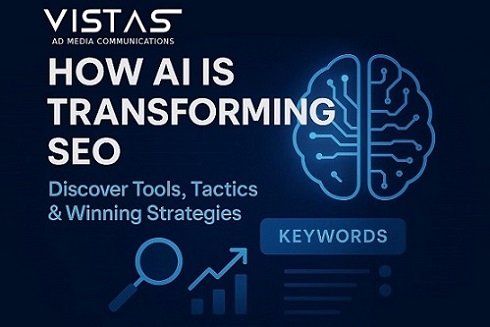


How AI is Transforming SEO: Tools, Tactics, and What Top Brands Are Doing Differently
Search Engine Optimization (SEO) has always been dynamic, but the advent of artificial intelligence (AI) has supercharged this evolution. From content creation to user experience, AI is reshaping how marketers approach SEO.
Integrating AI into search algorithms and digital marketing tools has not only changed the game’s rules—it’s rewritten them entirely.
In this blog post, we’ll explore how AI transforms SEO, the emerging trends brands need to stay on top of, and what major companies prioritise in their strategies.
AI in SEO is no longer a futuristic concept. It’s here, and it’s thriving. Here’s how:
Google’s AI-powered algorithm, RankBrain, was one of the earliest signals of AI’s integration into search. More recently, BERT and MUM have made search engines more sophisticated in understanding context, search intent, and semantics. This shift means keyword stuffing is out; high-quality, intent-focused content is in.
AI tools like ChatGPT, Jasper, and Surfer SEO are helping marketers create content faster, optimise it more precisely, and scale production without sacrificing quality. These tools analyse top-performing websites, suggest semantic keywords, and even generate content outlines—enhancing productivity and consistency.
AI can forecast trends, predict keyword opportunities, and anticipate user behavior. With predictive analytics, brands are now crafting SEO strategies based on future patterns, not just past data. This helps in staying ahead of the curve.
AI plays a critical role in voice and visual search technologies. Optimizing for voice search means targeting natural language queries and featured snippets, while visual search demands high-quality images with proper alt text, schema markup, and contextual relevance.
Google’s core updates have increasingly focused on website experience—load speed, mobile-friendliness, and interactivity. AI tools analyse bounce rates, heatmaps, and user flows to refine UX, indirectly improving rankings.
AI plays a transformational role in modern SEO strategies by automating tasks, improving accuracy, and helping marketers better understand user behaviour and search intent. Here’s a breakdown of how AI is influencing SEO:
AI helps search engines—and marketers—interpret the intent behind user queries. Whether someone wants to buy, learn, or compare, AI can analyse patterns in data to predict and align with that intent. This means content can be better tailored to meet what users are really looking for.
AI processes massive amounts of data quickly, spotting patterns humans might miss. It can:
AI enhances personalization by:
A better user experience can lead to lower bounce rates and higher dwell time, both positive SEO signals.
AI tools can automate tasks like:
This saves time and ensures consistent optimization.
AI in SEO = Smarter Strategy + Faster Execution + Better Results.
By leveraging AI, marketers can stay ahead of algorithm updates, craft more effective content, and provide a better experience for users—while maximizing efficiency.
Implementing AI tools for SEO effectively means more than just plugging in software—it’s about integrating AI into your overall SEO strategy to boost performance, productivity, and results without losing the human touch.
Here’s a step-by-step guide to help you do just that:
Before using any AI tools, define your objectives:
Clarity in goals helps you choose the right tools and measure their impact.
Common Categories:
| SEO Task | Recommended AI Tools |
|---|---|
| Keyword Research & Trends | Semrush, Ahrefs, Ubersuggest, Google Trends |
| Content Creation & Optimization | Jasper, ChatGPT, Surfer SEO, Frase, Clearscope |
| Technical SEO & Audits | Screaming Frog, Sitebulb, ContentKing |
| Competitor Analysis | MarketMuse, SimilarWeb, Crayon |
| Automation & Reporting | SEOTesting, Zapier, BrightEdge |
Pick 2–3 tools to start with—based on your goals, team size, and budget.
